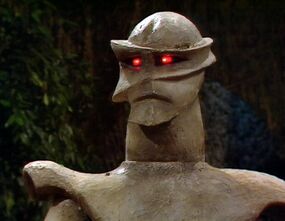More actions
Melkur was a name given in Trakenite culture to corrupted creatures which were attracted to the planet Traken, the seat of the Traken Union.
Biology
The word Melkur was literally, "a fly trapped in honey". The peaceful atmosphere of Traken rendered them immobile and harmless. Several Melkurs attracted to Traken. Most decayed without causing any longterm harm. They became like stone through the immobilisation.
Impersonation
The Melkur that seduced Kassia was more hostile than previous Melkurs and was revealed, shortly after the arrival of the Fourth Doctor and Adric, to be the Master's TARDIS. The Master utilised the Melkur form to become Keeper and take control of The Source. (DW: The Keeper of Traken)
Nyssa and Tegan saw an illusion of the Melkur intended to frighten them away from the Inner Sanctum presided over by Kalid. (DW: Time-Flight)
In Culture
Traditionally, a feast took place annually, called the 'Feast of Melkur', at which those attending participated in poetry, music, dance, recitals and performing arts of all varieties and calibres, to ease its passing. (ST: The Astronomer's Apprentice)
History
The Melkur were created by Malador in the Dark Times as his silent army. After Malador's imprisonment they slept throughout the universe in wait of their master's revival. (BFA: The Guardians of Prophecy)
Behind the scenes
- The word "Melkur" is similar to "Melkor" (later called Morgoth Bauglir), a character from J.R.R. Tolkien's books The Silmarillion, and The Children of Hurin. Melkor was also a malevolent creature, capable of causing weeds to sprout in the ground around him, much like the Melkur.

